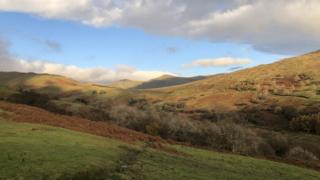
Soil erosion is altering the panorama of the Lake District
The Lake District is plagued by soil erosion at a “dramatic value” and will perhaps nicely question very assorted in 50 years’ time, an academic has warned.
Dr Simon Carr, programme chief for geography on the College of Cumbria, said rude local weather triggered by native local weather commerce is stripping the fells.
He argues halting grazing by animals could be a upright process to revive the land by permitting vegetation to boost.
On the alternative hand, farmers warn a “blanket ban” may perhaps result in meals shortages.
Dr Carr, who helped deliver collectively the Lake District’s Verbalize of the Park opinion in 2018, believes droughts adopted by devastating storms throughout the previous few years are on the guts of the misfortune.
Describe copyright
PA Media
Storm Desmond triggered flooding and landslides in December 2015
He said: “The stipulations are fully most interesting for inflicting degradation to the panorama.
“They desiccate the peaks, they dry it, they turned into very breakable and erode with ease in case you’ll dangle a storm.
“Or no longer it’s taken 10,000 years to originate the soils we question throughout the Lake District, and the worth of loss is genuinely fairly dramatic.
“Inside a pair of many years we’ll question the areas of naked rock we question on the mountains stretching further and extra down slope.
“We’re perhaps speaking about 50 years. It may perhaps in reality nicely be a lot much less.”
Dr Carr said there may very well be “predominant proof” of abrasion on the fells amounting to about 3cm (1.2in) per yr.
He moreover pointed to a upward thrust in natural carbon being veil in water as a result of peat being washed into rivers, and elevated sedimentation being veil in lake basins.
Dr Simon Carr admits banning grazing in an home looking on upland farming would no longer be customary
The acknowledge “theoretically” could be to remain grazing which might allow vegetation and blanket toilet – the “carbon retailer throughout the panorama”- to boost and “lock up the water that stops flooding being transferred to the valley bases”.
“We question tiny-scale restoration makes an attempt being undertaken the construct they right exclude grazing animals and it is rather, very profitable”, he said.
“However the size we favor to hold out that on is genuinely fairly mighty, and for an home that’s determined by upland farming that is by no means going to be a popular factor to hold out.”
Sarah Chaplain-Bryce, who runs Low Bridge Waste Farm, close to Keswick, has planted a wooded area by which she plans to graze sheep in an try and fabricate carbon-impartial meat.
She said: “We’re fully passionate [about the environment] and we do no longer fertilise as a result of we’re environmentally pushed, nonetheless we now dangle all purchased to eat.
“Should you purchased farming away the construct’s your meals going to close from? I do not narrate that you simply simply may wish to perhaps dangle a blanket safety – a one-size-suits-all does not work.”

No comments:
Post a Comment